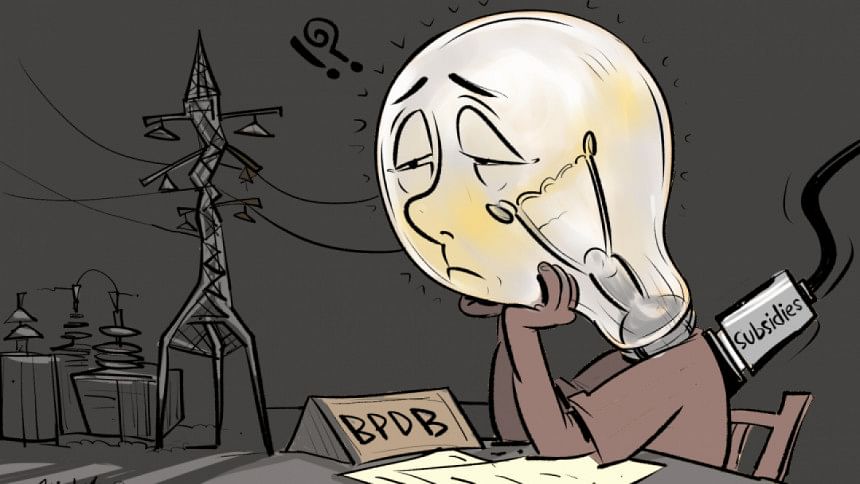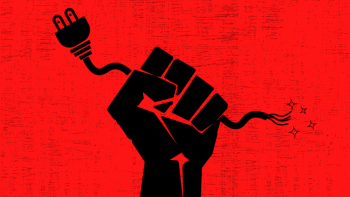Navigating energy efficiency for Bangladesh’s energy security

According to the International Energy Agency, a fundamental tenet of energy security is having a steady supply of energy at reasonable prices. Between 2009 and 2024, Bangladesh primarily focused on scaling up power infrastructure, while efforts to develop energy resources fell short. The country's exposure to the volatile international fossil fuel market increased during this time, leading to challenges in maintaining a steady energy and power supply. Soaring tariffs amid inflationary pressure in the last two years made energy less affordable to the low and lower-middle-income groups.
The government's efforts in the last one and a half decades contributed to economic growth; however, the road ahead is still bumpy, with fuel imports likely to spiral, which in turn might worsen the country's energy security.
At this time, it would be prudent to change the highly import dependent energy model. With different energy-consuming sectors providing significant energy efficiency (EE) opportunities, Bangladesh's approach to accelerating energy security should include EE at its core. Going forward, enforcing EE policy instruments and creating a favourable ecosystem for them to thrive in will be all-important to promote EE.
Bangladesh's energy efficiency and conservation master plan up to 2030 shows viable EE and conservation potential of 21% and 28.8% in the industry and household sectors respectively. However, a 10% efficiency gain on grid electricity consumption could lessen the country's power demand between 1,500 megawatts (MW) and 1,700MW (based on day and evening peak power demands during April to July 2024). Demand management could offer a multitude of benefits, such as delay or lessen the investment in new and large fossil-fuel-based power plants, and minimise fossil fuel import bills on the back of reduced demand for power.
Usually, Bangladesh has competing priorities in the power sector. It feels the burgeoning pressure to consistently invest in incremental power generation capacity and to improve transmission and distribution (T&D) systems. As EE provides relief by delaying the immediate demand for capital-intensive and large fossil-fuel-based power plants, the country can use freed-up resources to bring down T&D losses. This investment appears timely, given that the country registered T&D losses of around 10.3% in fiscal year (FY) 2022-23 against the global average of less than 8%. IEEFA's analysis concludes that a 1% improvement in T&D losses will reduce the country's energy generation needs by 884 gigawatt-hours (based on FY2022-23 data). This will help avoid oil import bills worth Tk 12.38 billion ($106.3 million) per annum (assuming the average fuel cost of producing electricity from oil-fired plants is Tk14/kilowatt-hour).
Moreover, industries and households display a notable gas-saving opportunity. IEEFA's study substantiated that EE in industrial captive power generation can reduce liquefied natural gas (LNG) import bills of $460 million per annum. EE in industrial processes demonstrates additional gas-saving potential. Likewise, due to billing systems for gas burners in most households not accounting for consumption quantity, people often exhibit wasteful gas consumption behaviours. If such behaviours are rectified through raising awareness, it could contain spiraling gas consumption and result in substantial national resource savings.
While EE can optimise energy consumption and accelerate energy security, Bangladesh needs to focus on policy enforcement to achieve the desired results.
The energy audit regulations (EAR), issued in 2018 and revised in 2024, specify guidelines for performing energy audits and the certification of energy auditors and managers. Furthermore, the Sustainable and Renewable Energy Development Authority (SREDA) declared 189 enterprises as large energy consumers (designated consumers) that are mandated to carry out energy audits and submit periodic reports.
A logical progression should ensure that designated consumers carry out energy audits and submit reports to the SREDA periodically. However, this step will only generate data on the EE potential of audited consumers and can at best motivate some consumers to implement a few energy-saving measures. Instead, setting up annual or periodic energy-saving targets for designated consumers will guide them towards EE for compliance purposes. SREDA should crosscheck the annual EE results of designated consumers and prescribe corrective measures to underperforming consumers.
The government could consider increasing energy savings targets of the designated consumers and enlarge their base. Verification and proper enforcement of EAR will encourage industries to establish a systematic energy management practice to achieve the highest level of efficiency.
On the other hand, the Bangladesh government issued the EE labelling regulations in 2023, laying the foundation for assessing the minimum energy performance standards (MEPS) of different appliances. Energy efficiency labels should be introduced, based on MEPS, to help consumers make informed decisions while purchasing lights, fans, air conditioners and other appliances.
Once labels for appliances are available, the Bangladesh Standards and Testing Institution should regularly monitor the market to phase out appliances that do not meet the MEPS.
Energy-efficient refrigerators and air conditioners with inverters are already costlier than their counterparts without inverters. As the FY2024-25 national budget has imposed higher minimum import duties on imported compressors that have inverters, consumers will find energy-efficient refrigerators and air-conditioners more expensive. The government should revisit the duty imposed on imported compressors with inverters and develop an ecosystem to encourage the use of efficient appliances. Once the country achieves adequate manufacturing capacity to meet local demand, the government could reimpose such duties.
If the country builds on its strong EE potential, it can reduce imported energy dependence and utilise monetary savings to upscale clean energy and enhance energy security. Furthermore, higher energy prices make the investment in EE expedient.
Shafiqul Alam is lead energy analyst for Bangladesh at the Institute for Energy Economics and Financial Analysis (IEEFA).
Views expressed in this article are the author's own.
Follow The Daily Star Opinion on Facebook for the latest opinions, commentaries and analyses by experts and professionals. To contribute your article or letter to The Daily Star Opinion, see our guidelines for submission.

 For all latest news, follow The Daily Star's Google News channel.
For all latest news, follow The Daily Star's Google News channel. 










Comments